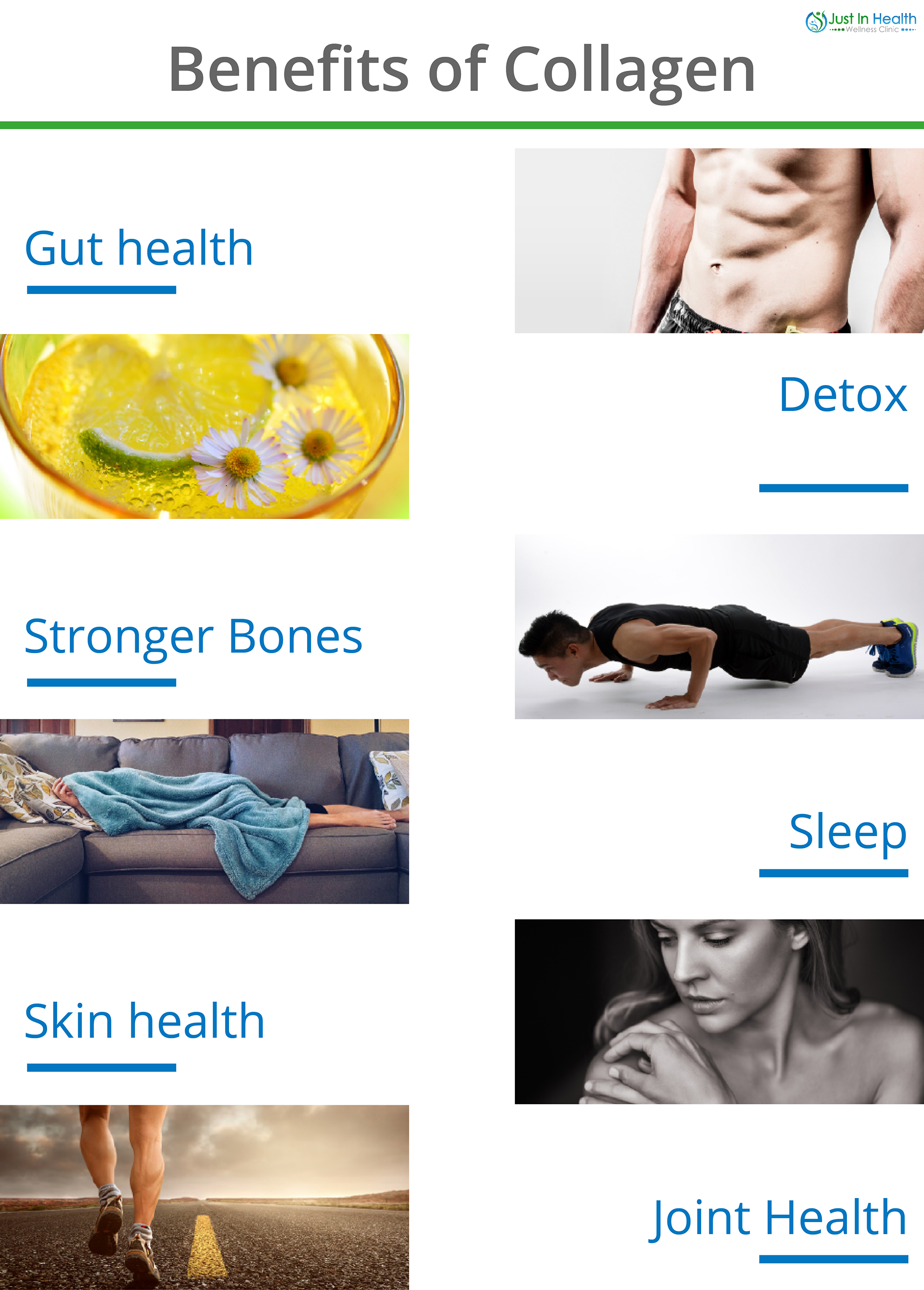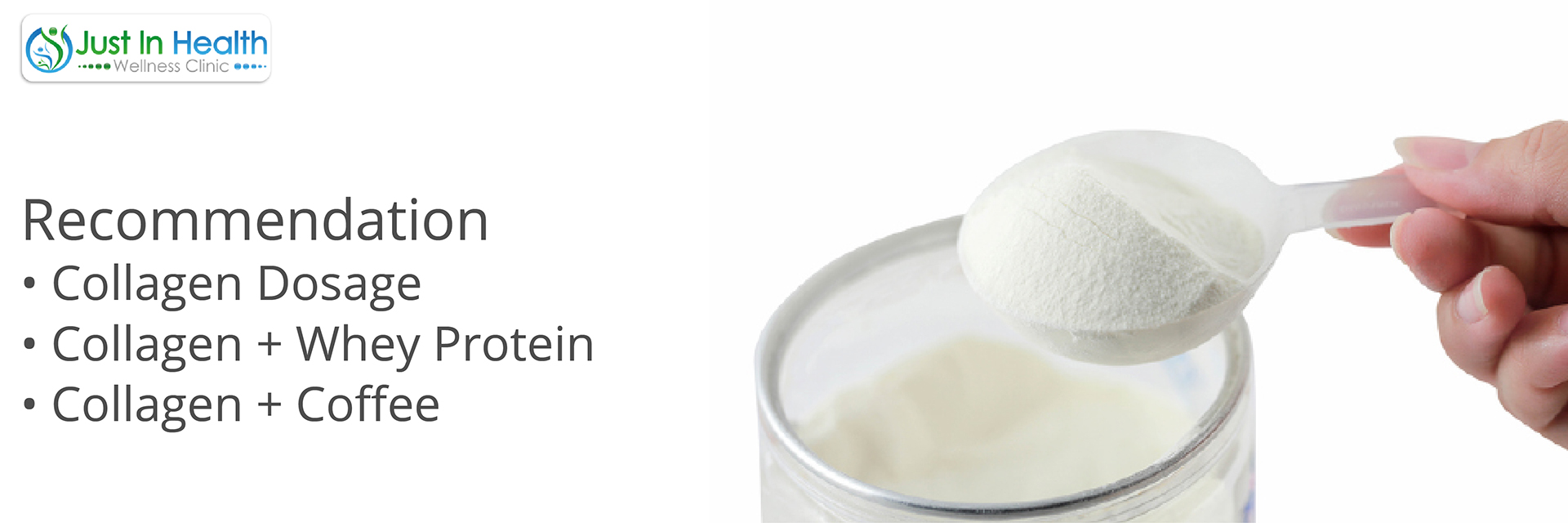

By Dr. Justin Marchegiani
Today’s video is going to be on collagen. Collagen is a very important compound. About 70% of the protein in your body is made from collagen. We’re going to talk about the benefits, the pros, the cons and what you can do to increase your collagen level naturally.

Collagen is a typical amino acid protein. We have gelatin, which is collagen before it's broken down. People know gelatin is like you can make Jello out of it and such, and that's a really good component. Again, you have a lot of long chain amino acids built up and that's why if you add water to it, it gets very gelatinous, hence, the word gelatin.
Now what we've done with collagen is we’ve hydrolyzed it. We broke it down via water and various blending techniques so those amino acids are shorter if they're broken down and they're easier to absorb and when you put it in water, you know collagen is hydrolyzed because it won't create this gelatinous type of feeling in there. So you can use it supplementally to add it to your water, to your protein drinks as a great benefit, and we're going to go over why.

So collagen is great for gut health or GI health. Collagen, again, is an amino acid spectrum, so it has a lot of different aminos in it. One of the best ones for gut health is going to be an amino acid called glycine. Glycine is actually found in bone broth as well. So if you heard of the GAPS diet, it is one of the big proponents to helping to heal a leaky gut. It is very high in glutamine which is very healing on the gut lining. The same glutamine is what’s really high in bone broth. That is what the healing benefit comes from. It's also very high in glutamic acid or glutamine which can be very helpful to healing the gut lining, the enterocytes in the GI tract.
Again, when the gut is inflamed, we get this thing called a leaky gut or gastrointestinal permeability. What happens is the tight junctions open up, kind of like a zipper unzipping your jacket, and undigested food particles and things known as LPS or lipopolysaccharides from bad bacteria can get in your bloodstream. This will create an immune response which is not good.
Glycine’s a really big precursor to glutathione. Anyone that has run an organic acid test will see glycine is really important for that phase 2 detoxification. It really involves a lot of the sulfur amino acids and collagen. And collagen is very high in alanine as well as glycine on the amino acid spectrum, lower in methionine but higher in glycine.
About 50% of your bones are made from protein. People forget that. People think, “Oh well, calcium’s bones.” Well, actually, to make up your bones—if you cut your bones in half, half of it is minerals, the other half is protein. The majority of that protein is going to come from collagen. Half of the minerals are going to come from about 12 to 13 different minerals, calcium being the most but there's a spectrum of minerals there. It’s not just calcium. So when you think bone health, I rather have you gravitate towards collagen than gravitate towards calcium.
Get the real deal on collagen by contacting a functional medicine doctor HERE!
Glycine is really important in helping to modulate cortisol at night and help promote healthy relaxation. When your cortisol levels are high, it’s going to prevent you from getting to sleep because you'll be too ramped up. Things like light can do that. Like Netflix series, maybe watching too much Walking Dead before bed, that may keep you up. So glycine can really help buffer that cortisol at night and promote relaxation and restful melatonin levels.
Because collagen is that foundational matrix to the skin, we get very good skin integrity with higher levels of collagen. It is hypothesized that once you pass the age 30, you lose about 1%-2% of collagen per year in the skin in the tissues, hence, elderly people have the aging and the wrinkles, so we can work on promoting that by having good healthy protein and fats in our diet but we can also supplement with bone broth and also collagen supplementation to help provide those extra amino acids.
One of the best things about a good collagen that is hydrolyzed, it is in its peptide form, is that even if you have poor digestion—let’s say you have a hydrochloric acid issue, you have a gut infection or SIBO, or low enzyme levels, the collagen being already pre-broken down— it is still allowed to go into your bloodstream with very minimal effort on the digestive side. So if you have digestive issue, it's a great insurance policy.
I talked about 50% of the joint is or the bone part is protein and collagen being the majority of that. We can't forget tendons and ligaments and also the disc right there, intervertebral discs are all made from collagen as well. So if you have any joint pain, if you have any back pain, any disc herniations or bulges, it’s going to be really important that you provide the building block. The first thing is get out the inflammatory foods that are causing digestive inhibitions and then get the good nutrients on board so a good Paleo template is great to start and then adding in the extra bone broths and/or collagen supplementation is a great place to start.
Like I mentioned, if we don't have good collagen levels, we're going to have joint issues and seeing a lot of patients on the musculoskeletal side for many years. One of our main go-to was adding good high quality protein and collagen supplementation to help provide the building blocks. Because if we're moving, getting those joints to function better, we have to provide the raw material so it can heal.
We talked about leaky gut. If we have low glycine and low amino acid levels, it will make it harder for us to heal our guts. Again wrinkles, forget the internal health issues, just people want to look and feel healthy on the outside as well. So having the good internal collagen is great. You'll see a lot of hyaluronic acid and you'll see a lot of collagen in topical form which is okay. But frankly, you're not going to be able to get enough collagen topically to really be able to help your skin at a therapeutic level. We want to take it internal.

I typically mix my collagen in with either a beef protein, a pea or a whey protein. Now here’s actually the collagen that I formulated myself. I was tired of trying to find good collagen products in the market because there aren’t as many. So I was able to source one from Argentina that was grass-fed and we had even hydrolyzed it. We had broken it down enzymatically in a way so you can break it down if you have poor digestion.
I have a lot of patients who have compromised gut issues and they need to be able to break down their nutrients. So we make diet changes. We make lifestyle changes. Also, we give digestive support like enzymes and acids and bile salts. We cut out the bad foods and remove the infections.
But during that timeframe, we need to make it easy so the body can access amino acids. Because if not, we'll be in a catabolic state where we’re breaking down faster than we're building up. That will cause us to have a difficult time having good bones, good cartilage, good ligaments, good tendons and good muscle structure.
So having good quality collagen is a great place to start. So I’ll put this on screen so you can access it if you like. It's the one that I'm using currently with all of my patients as well. Typically I formulate products for myself first because I'm saying, “Alright, what's the best product I can make for me?” And then if I like it and I use it, then other people and my patients will definitely be able to benefit from it.
I typically recommend between 20 to 60 grams of collagen per day for my patients. So we'll do it in a scoop as we can get a very high amount. Some people have like capsules. I did the math. You got to take about 30 to 40 capsules to really get there therapeutically. So I'll do two scoops and my brand is about 30 grams of collagen which is a pretty high amount. Typically, 2 scoops is 30. We will do between 4 and 5 scoops a day, if we're trying to get at a therapeutic level. I typically do 2-3 scoops maintenance.
This morning, I used my beef protein and I combined it with my collagen. There where I got about 40 grams of protein and about 20-30 of that was collagen. About 20 of that or so was the good, high quality grass-fed beef protein. So, a great place to start.
If my patients are autoimmune, I typically recommend starting with a good collagen and/or a pea or collagen and/or beef. Depending on where they’re at, my pea protein has no artificial flavors or junk in it at all. So I tend to lean towards that because even maybe a sugar alcohol, or a Stevia even if it's clean, someone with a gut issue may be sensitive. So I like going collagen and pea. These are really good sources to combine. I love doing whey as well. The problem with whey is a tiny bit of lactose in there and a tiny bit of casein. Again, if you're in good health, it’s not a problem. If you have gut issues right now, or you have an autoimmune condition you're trying to get under control, you probably want to stay away from the whey protein until you get more stabilized. So typically pea is a good starting point. If you're better, then you can have beef and you can combine that with collagen interchangeably.
The nice thing about collagen is it's pretty flavourless, which is great. So you can take maybe a tablespoon or so, add it to your coffee if you want; and you can make a really nice Bulletproof coffee with the collagen in there so you get the good fats and you get the good proteins. And the nice thing about it is that you're building up the raw material for your tendons and for your ligaments and for your joints. So as you get older, if you're having any pain issues, we don't want to be reaching for the Ibuprofens on a day-in and day-out basis. This isbecause of their negative effects with the gut and liver. We are much better off reaching towards anti-inflammatory herbs and anti-inflammatory nutrients to help build our body up strong.
So take home, if you have gut issues, collagen is a great product to add in to help soothe and help heal the gut lining. Don't forget though if we have something like SIBO or gut infection like a parasite, we want to remove the actual underlying cause. Adding in healing and suited nutrients is great. We just got to make sure we’re getting to the root cause. If I have a splinter in my arm and I just put some healing salve around it so it heals well. If I don't pull the splinter out, all that is going to be for naught. So make sure we’re digging in deep and we're looking at the root cause of why you're feeling the way you're feeling.
Collagen is a great first step because there are not really any side effects; only side benefits to help support a lot of issues, not treat.
So any questions, click on screen if you want to get access to the one collagen product I just formulated called TRUCOLLAGEN. Any questions, please feel free and let me know. Make sure you subscribe so you get access to more great videos like this coming your way.